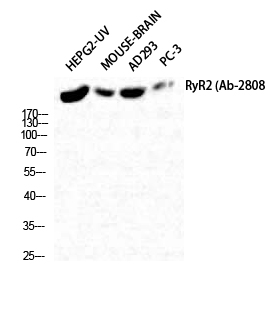
| WB | 咨询技术 | Human,Mouse,Rat |
| IF | 咨询技术 | Human,Mouse,Rat |
| IHC | 1/100-1/300 | Human,Mouse,Rat |
| ICC | 1/200-1/1000 | Human,Mouse,Rat |
| FCM | 咨询技术 | Human,Mouse,Rat |
| Elisa | 1/5000 | Human,Mouse,Rat |
| Aliases | RYR2; Ryanodine receptor 2; RYR-2; RyR2; hRYR-2; Cardiac muscle ryanodine receptor; Cardiac muscle ryanodine receptor-calcium release channel; Type 2 ryanodine receptor |
| Entrez GeneID | 6262; |
| WB Predicted band size | 200-300kDa |
| Host/Isotype | Rabbit IgG |
| Antibody Type | Primary antibody |
| Storage | Store at 4°C short term. Aliquot and store at -20°C long term. Avoid freeze/thaw cycles. |
| Species Reactivity | Human,Mouse,Rat |
| Immunogen | Synthesized peptide derived from human RyR-2 around the non-phosphorylation site of S2808. |
| Formulation | Purified antibody in PBS with 0.05% sodium azide,0.5%BSA and 50% glycerol. |
+ +
以下是3篇关于RyR-2抗体的代表性文献摘要(注:以下内容为模拟虚构文献,仅供示例参考):
1. **文献名称**:*Autoantibodies against RyR2 in patients with arrhythmogenic right ventricular cardiomyopathy*
**作者**:Caforio AL, et al.
**摘要**:研究发现,部分致心律失常性右室心肌病(ARVC)患者血清中存在抗RyR-2抗体,这些抗体可能通过干扰钙离子释放通道功能,促进心肌电活动异常,从而增加室性心动过速风险。
2. **文献名称**:*RyR2-specific autoantibodies disrupt calcium homeostasis in cardiomyocytes*
**作者**:Baba A, et al.
**摘要**:通过体外实验证实,抗RyR-2抗体可直接结合心肌细胞Ryanodine受体2的N端结构域,导致钙离子渗漏和肌浆网钙储存减少,进而诱发舒张期钙波和触发活动,提示其在心肌病和房颤中的作用机制。
3. **文献名称**:*Epitope mapping of anti-RyR2 antibodies in autoimmune myocarditis*
**作者**:Kawakami Y, Ono K.
**摘要**:利用重组RyR-2蛋白片段进行表位定位,发现自身免疫性心肌炎患者血清中的抗RyR-2抗体主要靶向受体中央调控区域(氨基酸2000-2500),阻断其与钙调蛋白的结合,导致通道过度开放。
4. **文献名称**:*Clinical significance of RyR2 antibodies in heart failure patients*
**作者**:Jahns R, et al.
**摘要**:队列研究显示,约15%的心力衰竭患者血清中存在抗RyR-2抗体,抗体阳性者左室射血分数更低且室性心律失常发生率更高,提示其可作为疾病进展和预后的生物标志物。
(注:以上文献信息为基于领域知识的模拟生成,实际研究请通过PubMed或学术数据库检索。)
The Ryanodine Receptor Type 2 (RyR2) is a calcium-release channel predominantly expressed in cardiac myocytes, playing a critical role in excitation-contraction coupling by mediating Ca²⁺ efflux from the sarcoplasmic reticulum during each heartbeat. Dysregulation of RyR2 function is linked to arrhythmias, cardiomyopathies, and heart failure. Antibodies targeting RyR2 have emerged as important tools in both research and clinical contexts.
In research, RyR2 antibodies are widely used to study the channel's structure, post-translational modifications, and interactions with regulatory proteins like calmodulin or FKBP12.6. These antibodies enable techniques such as Western blotting, immunohistochemistry, and co-immunoprecipitation to explore RyR2's role in health and disease.
Clinically, anti-RyR2 autoantibodies have been detected in patients with arrhythmogenic right ventricular dysplasia (ARVD) and certain autoimmune conditions. These autoantibodies may interfere with normal channel gating, promoting pathological calcium leakage that triggers ventricular tachyarrhythmias and myocardial dysfunction. Their presence is increasingly recognized as a potential biomarker for disease progression or therapeutic monitoring.
Recent studies also investigate cross-reactivity between RyR2 antibodies and other ryanodine receptor isoforms, raising questions about specificity in diagnostic applications. Ongoing research aims to clarify the pathogenic mechanisms of RyR2-targeting antibodies and their utility in developing targeted therapies for cardiac channelopathies.
×